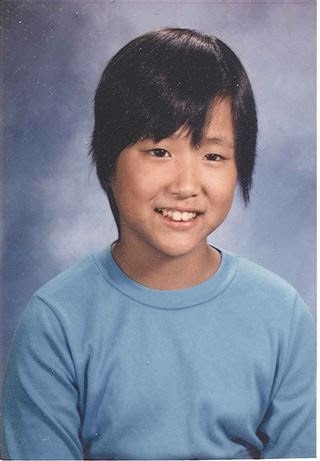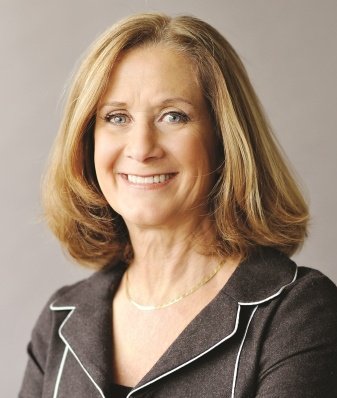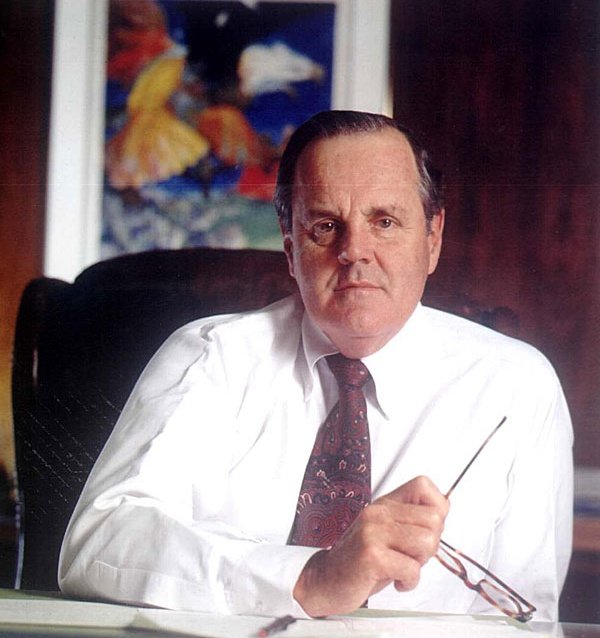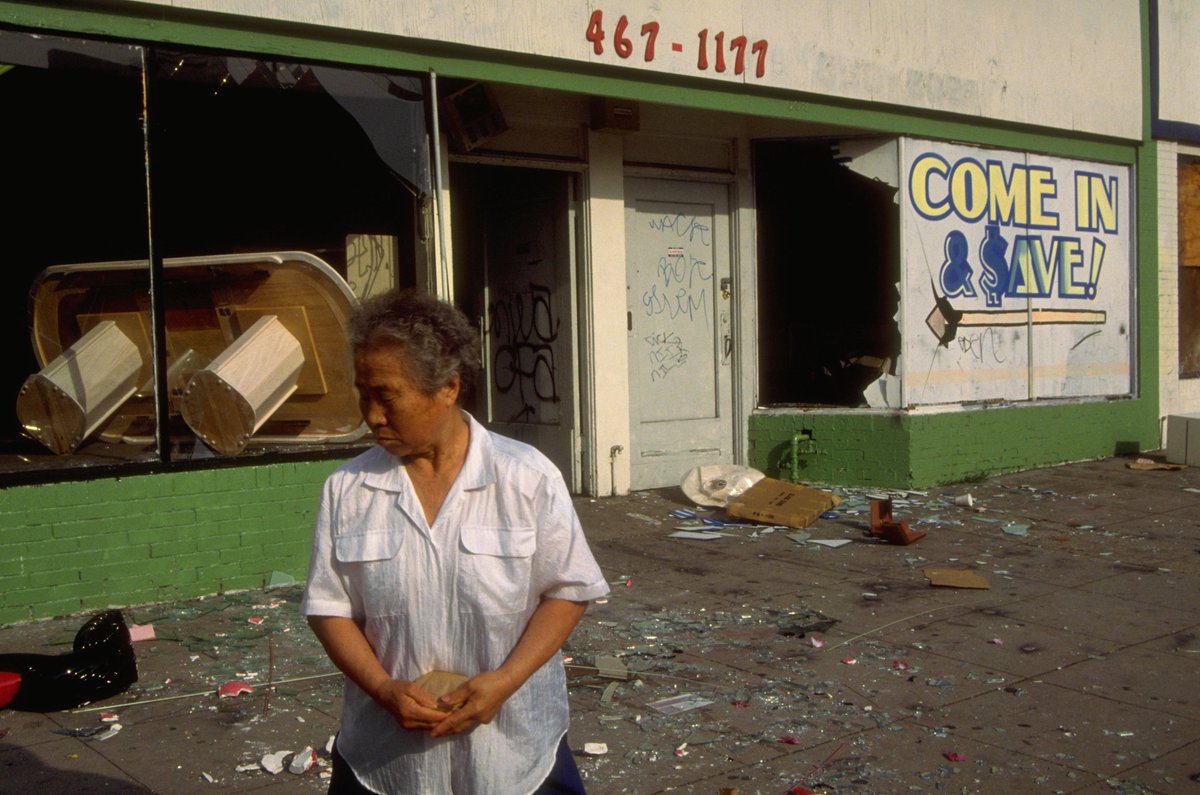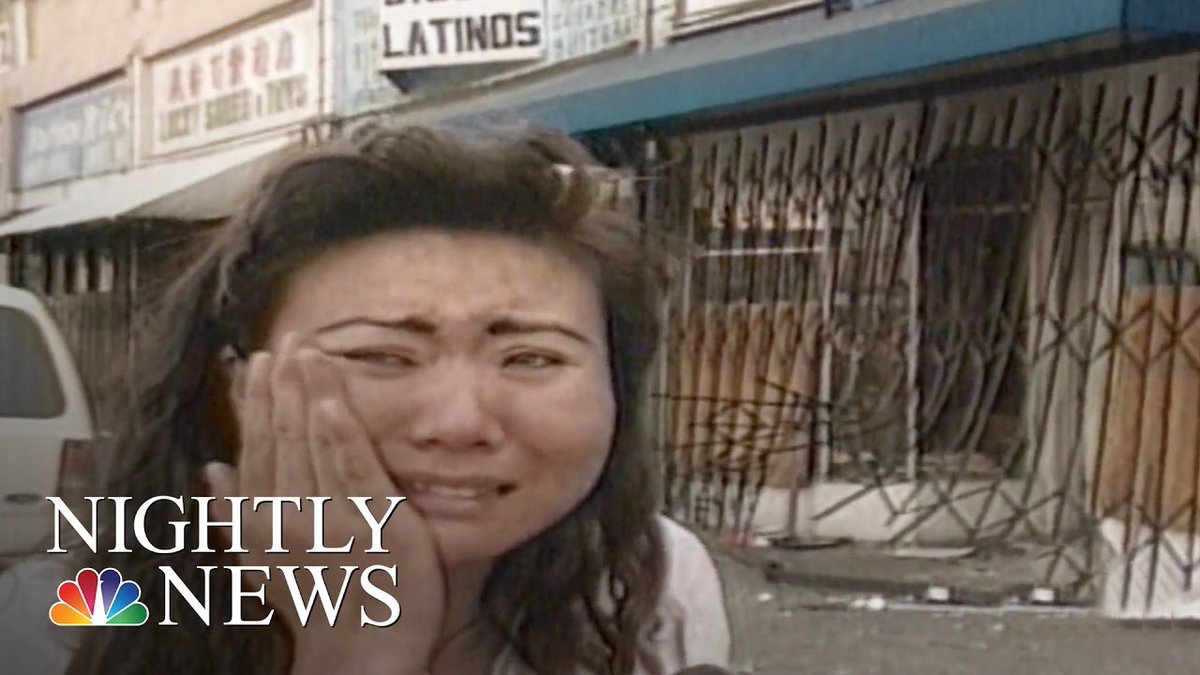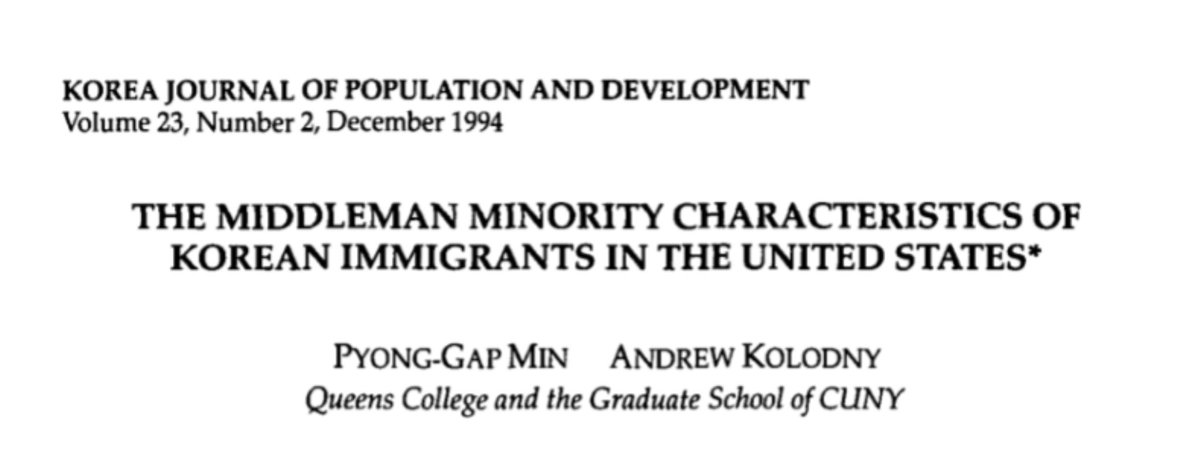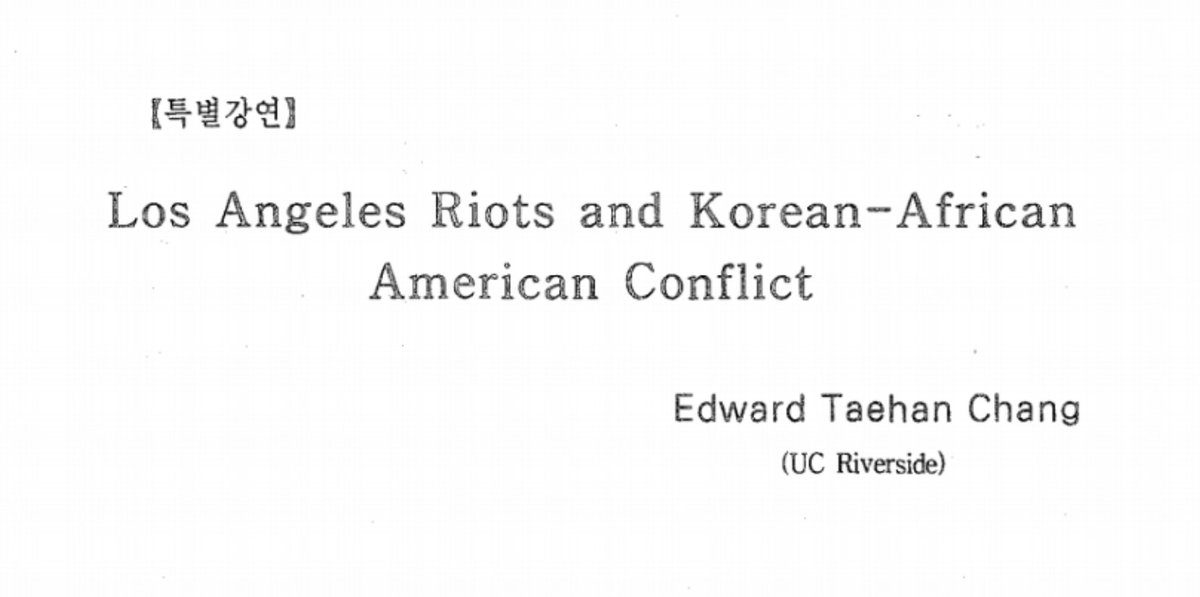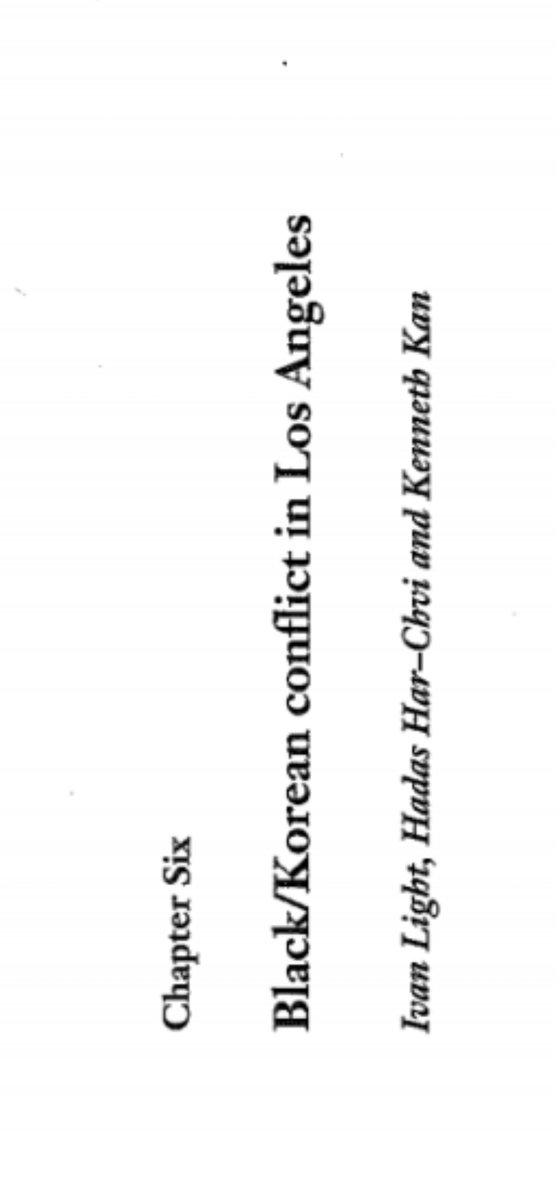So because these teenagers are talking out their ass about 1990s LA again, it& #39;s time to have a little talk. You want to know my views on this? Ok, let& #39;s go.
The 1992 LA riots: a thread.
The 1992 LA riots: a thread.
First, let& #39;s set the stage. It& #39;s important to understand how Black and Korean ppl ended up in a high poverty, high crime area together and created a very high tension environment full of racism and violent hate crimes. History time.
Compton used to be a predominantly white city. But after racist housing practices were stopped by the Supreme Court & later the Watts Riots of 1965, white flight changed the demographics of the area. Manufacturing jobs left the area and drugs, gangs, & violent crime proliferated.
By the 80s, South Central LA was the place you heard about on TV and songs such as "Straight Outta Compton". No white business owners wanted to be there anymore. Prices went way down to rent or own commercial buildings. Enter Korean immigrants.
There& #39;s a misconception that the Koreans of South Central LA were this elite merchant class, rolling in profits, but this was not true in the 80s and 90s. People in my mom& #39;s generation were born either during or right after the Korean War into devastating poverty.
And when I& #39;m talking about poverty, I& #39;m talking about a 6 person family sleeping on the floor in one single room. Wearing a single pair of shoes every day for 3+ years, walking into the mountains just to find some wild fruit for dinner. Having to use newspaper instead of tampons.
This is the economic class people like my mom were born into. So when they took the chance to immigrate to the US and saw crime filled S Central LA, they were already hardened, and they accepted it. They saw the opportunity to make ends meet, but it came with a price.
It& #39;s 1991. This is Carol. Her dad passed away, so she has to help her mom on nights and weekends as a cashier. Every night, she gets verbally abused and called racial slurs like "chink, gook, whore, nip, bitch", by grown ass men. She is 10. Working behind bulletproof glass at 2am
The gas station across the street is constantly getting robbed. The racist abuse this 10 year old endures hardens her and makes her mad, and she occasionally answers the slurs by throwing a couple around herself.
When I say the racism went both ways, this is what I mean.
When I say the racism went both ways, this is what I mean.
When you& #39;re surrounded by violence and hate every day, it seeps into your soul. As economic conditions worsened, and policing got more brutal, it only increased tensions. By the time Latasha Harlins was shot, LA was already set to explode. So let& #39;s talk about what happened.
The way the media has fixated on Latasha Harlins, you might think that was the first deadly incident or injustice to happen between Black and Korean people in 1990s LA. Even to this day, the media has successfully convinced people that one single event sparked the riots. Nope.
The media kept focusing on the Black Korean conflict and fanning the flames long before this. Remember, they needed something to keep deflecting from the big problem of systemic injustice and police brutality. You know, the stuff that led to the Watts Riots.
For years, Korean store owners were getting robbed, assaulted, stabbed, shot. Some of them defended themselves with guns. The media only reported on Koreans shooting Black people but never reported on things like the 10 Koreans who were robbed and killed in LA in 1991 alone.
There is this flattened view of the Koreans in LA that persists to this day, in part, because the media straight up ignored their deaths. And the Koreans were aware of this.
You can imagine the tension and the horrible environment now, right?
Now this sets the stage for 1992.
You can imagine the tension and the horrible environment now, right?
Now this sets the stage for 1992.
Latasha Harlins was killed in 1991. This is the part everyone knows. Soon Ja Du thought the 15y/o was shoplifting orange juice and grabbed her as she was walking away. Latasha punched Ja Du in the face, then tried to leave. The next second, she was shot in the back of the head.
Let me be clear about this part. Soon Ja Du got physically assaulted but then responded with literally murdering someone, she should still be in jail for murder, it was so fucking wrong how her case went.
History will NOT redeem her, no matter what other details may surface.
History will NOT redeem her, no matter what other details may surface.
So this incident, out of all the killings and violence, stood out bc it highlighted the utter injustice the Black community suffered. If Soon Ja Du had been properly sentenced and locked away, no one, Korean or otherwise would have argued. No one. But that& #39;s not what happened.
Let& #39;s consider the other KEY thing that happened right in this same time frame. Rodney King was beaten senseless by LAPD officers in an incident that was-not particularly out of the norm for police, BUT this one was caught on tape and replayed and replayed and replayed on TV.
So the timeline was:
March 3, 1991 - Rodney King beaten
March 16, 1991 - Latasha Harlins killed
November 1991 - Soon Ja Du trial
April 1992 - Rodney King trial
By April, the buildup of rage in the community w/ these incidents dominating the news cycle was palpable.
March 3, 1991 - Rodney King beaten
March 16, 1991 - Latasha Harlins killed
November 1991 - Soon Ja Du trial
April 1992 - Rodney King trial
By April, the buildup of rage in the community w/ these incidents dominating the news cycle was palpable.
Here& #39;s why the trials are important but frequently get left off the narrative.
Judge Joyce Karlin declined to properly sentence Soon Ja Du for murder.
Judge John G Davies declined to properly sentence the officers for wanton violent abuse.
The justice system holds the power.
Judge Joyce Karlin declined to properly sentence Soon Ja Du for murder.
Judge John G Davies declined to properly sentence the officers for wanton violent abuse.
The justice system holds the power.
I& #39;ll state it again.
The system, the racist justice system, holds the power, and has given no bit of justice to the Black community that hasn& #39;t been fought for and paid for in blood and lives.
The system, the racist justice system, holds the power, and has given no bit of justice to the Black community that hasn& #39;t been fought for and paid for in blood and lives.
Koreans in 1990s LA had no influence, no power. Their lives and deaths were at most, a footnote, virtually ignored until they became a useful shield to deflect away from the racist justice system. And the conditions that led to those tensions have not materially changed.
That& #39;s why Korean, and really in general Asian, small businesses get targeted in metropolitan areas whenever a riot happens. Even in recent times.
Because Asian immigrants occupy the space adjacent to poor communities of color that middle class white people don& #39;t want.
Because Asian immigrants occupy the space adjacent to poor communities of color that middle class white people don& #39;t want.
That& #39;s why they are a convenient scapegoat. Because although they are not the economic elites, they have come to represent the systemic inequality that was present in the US when they arrived.
That& #39;s why I called for supporting people like Kyung Park. https://twitter.com/dotorii_muk/status/1266552250811416576?s=19">https://twitter.com/dotorii_m...
That& #39;s why I called for supporting people like Kyung Park. https://twitter.com/dotorii_muk/status/1266552250811416576?s=19">https://twitter.com/dotorii_m...
So now let me dispel several myths and misconceptions people had about the LA riots themselves. Because there are many. Oh, there are many.
Here& #39;s the biggest myth that gets spread around: an army of Rooftop Koreans was shooting Black people left and right. No.
The Korean immigrants realized the police were locking down every other area while completely ignoring K Town, essentially funneling the violence to them. /
The Korean immigrants realized the police were locking down every other area while completely ignoring K Town, essentially funneling the violence to them. /
/ The Koreans of S Central LA were networked with each other, and knew the impending destruction. In an interview, one of the store owners recalls her Black employee actually warning her that people "are heading over there" and to "stay home".
Source: https://youtu.be/G_UyYj-pR8U ">https://youtu.be/G_UyYj-pR...
Source: https://youtu.be/G_UyYj-pR8U ">https://youtu.be/G_UyYj-pR...
Calls to the police and the fire department for help were ignored. One call was answered by a voice saying, "hope you have insurance."
Literally the only thing to do was to run away and allow their livelihoods to be burned to the ground. And many of them did exactly that.
Literally the only thing to do was to run away and allow their livelihoods to be burned to the ground. And many of them did exactly that.
The "Rooftop Koreans" though, of course, became the focus of the media. You& #39;ll see the same 5 or 6 photos circulating on the internet because a number of these Korean men decided to defend their own, and each others& #39; shops from looting and arson.
They did not shoot to kill. They shot at the ground, away from the rioters- they were trying to scare people away, not kill them. The statistics will tell the truth. No Black people were killed in the borders of Korea Town during the riots.
Source: https://spreadsheets.latimes.com/la-riots-deaths/">https://spreadsheets.latimes.com/la-riots-...
Source: https://spreadsheets.latimes.com/la-riots-deaths/">https://spreadsheets.latimes.com/la-riots-...
Another idea that gets thrown around a lot is that Koreans never learned from this "and never held themselves accountable for their anti-Blackness". So let& #39;s examine the events that followed the riots.
First, Soon Ja Du paid restitution to the family: https://www.nytimes.com/1992/07/09/us/korean-grocer-settles-suit-in-girl-s-slaying.html">https://www.nytimes.com/1992/07/0...
First, Soon Ja Du paid restitution to the family: https://www.nytimes.com/1992/07/09/us/korean-grocer-settles-suit-in-girl-s-slaying.html">https://www.nytimes.com/1992/07/0...
And even before the riots happened, the Koreans of LA knew the tension between the communities and tried to build programs and events to create a cultural bridge. These were largely ignored, and so died down after just a few months.
Today, efforts continue through groups like K Town for All, working to solve economic inequality in the area.
Is it enough? No, all of our communitys efforts won& #39;t ever be "enough" until the problem of systemic inequality and injustice is solved.
But don& #39;t ignore the details.
Is it enough? No, all of our communitys efforts won& #39;t ever be "enough" until the problem of systemic inequality and injustice is solved.
But don& #39;t ignore the details.
Finally, for the love of god, please look up how the media has fixated on and AMPLIFIED this racial conflict AND silenced poc journalists in the process of deflecting from the larger issue of systemic injustice and police brutality. This pattern continues. https://twitter.com/dotorii_muk/status/1284712418401308672?s=19">https://twitter.com/dotorii_m...
I hope this is enough to show you something about the real issues our communities have been facing, amplified by the prevailing white media narrative, perpetuated by liberal and conservative alike.
It& #39;s easy to flatten the voices of those without power and obscured by history.
It& #39;s easy to flatten the voices of those without power and obscured by history.
Watch list:
LA 92: https://youtu.be/uaotkHlHJwo
Sa-I-Gu:">https://youtu.be/uaotkHlHJ... https://youtu.be/G_UyYj-pR8U
POC">https://youtu.be/G_UyYj-pR... journalists being silenced: https://youtu.be/6P0m0Rc3_lE
Interviews">https://youtu.be/6P0m0Rc3_... with Koreans who lived through this firsthand: https://youtu.be/zC37uRMETx4
Reading">https://youtu.be/zC37uRMET... list:
Memoir of a Cashier by Carol Park
LA 92: https://youtu.be/uaotkHlHJwo
Sa-I-Gu:">https://youtu.be/uaotkHlHJ... https://youtu.be/G_UyYj-pR8U
POC">https://youtu.be/G_UyYj-pR... journalists being silenced: https://youtu.be/6P0m0Rc3_lE
Interviews">https://youtu.be/6P0m0Rc3_... with Koreans who lived through this firsthand: https://youtu.be/zC37uRMETx4
Reading">https://youtu.be/zC37uRMET... list:
Memoir of a Cashier by Carol Park
Additional readings. I will share these with anyone interested, just DM me. I will probably make a google drive link soon.
And @lycheecubes, I especially hope you read at least some of this. I& #39;ve seen your posts, I know you are passionate about racial justice, and like you, I come from multiple racial communities.
I think it does more justice to those communities to tell the full story.
I think it does more justice to those communities to tell the full story.
As promised, here is a link of a few readings. I highly recommend Memoir of a Cashier, it& #39;s not available to read online, so I will have to figure out something.
https://drive.google.com/folderview?id=1eZ_tfNWWZf76Lce3ferlfsCPB0UtrTb9">https://drive.google.com/foldervie...
https://drive.google.com/folderview?id=1eZ_tfNWWZf76Lce3ferlfsCPB0UtrTb9">https://drive.google.com/foldervie...

 Read on Twitter
Read on Twitter